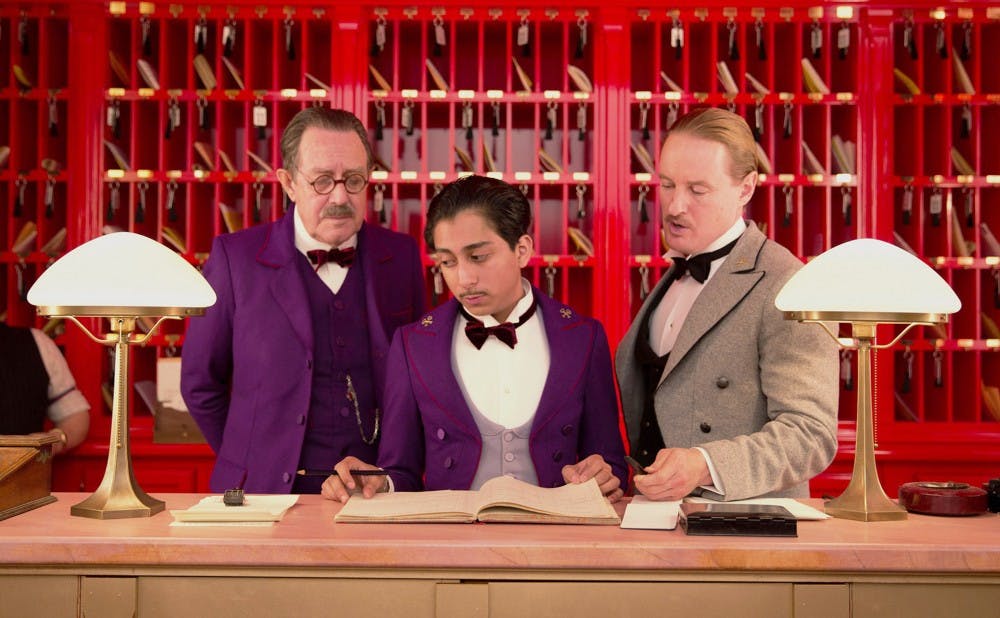Dir. Wes Anderson
Scott Rudin Productions
4/5 stars
“The Grand Budapest Hotel” is a delight. As in most Wes Anderson films, the deliberate, storybook cinematography—each moment of the film could stand alone as a still—are a joy to experience. This film stood out in particular from Anderson’s other films, boasting a flair for grandiose storytelling with likable characters amid the director's same polarizing nostalgia.
The film is a narrative within a narrative, starting with a teenager reading a book titled "The Grand Budapest Hotel." The book, authored by The Author, is a memoir and takes us back to 1932, when the young writer (Jude Law) stays at the solitary, glitzy hotel in the now-nonexistent Republic of Zubrowka. He meets the lonely hotel owner, Zero Moustafa (F. Murray Abraham), who emotionally recounts his time as a lobby boy back when the hotel thrived under the illustrious, poetry-reciting concierge, Monsieur Gustave, brilliantly played by Ralph Fiennes. Despite the recently immigrated Zero’s “zero experience, zero education and zero family,” M. Gustave takes him on as a protégé when Zero explains, “Who wouldn’t want to be a lobby boy at the Grand Budapest Hotel? It’s an institution.”
Caught in the rise of fascism and bequeathed with a priceless painting titled “Boy with Apple,” M. Gustave finds himself thrown into a high-security prison and Zero must break him out. Mixed into the great escape are many pastel-colored pastries, liberally applied cologne, a brass-knuckled assassin (Willem Dafoe), the Society of the Crossed Keys and, above all, exceptional manners and service.
Once again, we meet a variety of characters, all memorable in physical appearance and silly quirks. Most importantly, the primary characters only grow more endearing. Anderson’s stories often feel circular and his characters tend to grow annoying, usually due to a staunch refusal to change their ways or minds: I started rolling my eyes in “The Royal Tenenbaums,” “Moonrise Kingdom” was a bit too twee and kitschy and I wanted just a bit more self-awareness from “Rushmore.” Here, we are endeared to M. Gustave as he charms his way out of most situations and we appreciate Zero’s penciled-in moustache and deadpan devotion to M. Gustave and the hotel.
Typical of most Wes Anderson films, “The Grand Budapest Hotel” doesn’t appeal so much to our emotions as it does to our senses of childlike fascination and wonder. Anderson relays a story, harking to what The Author says about writing books: when you’re a writer, the stories—the characters—will come to you. Here is a story with three chapters, each distinguished by a different aspect ratio, about Anderson’s most meticulously crafted and inventive world, which involves an old-fashioned handmade model of the Grand Budapest.
This is a well-rounded film set in the dazzle of the quintessential Wes Anderson universe and caught somewhere between an elegant frenzy and a dark whimsy. The story is not lost in the impeccable scene composition. The vibrantly manicured styles captivate us visually, but we’re kept on the edge of our seats by an orchestrated caper (high-speed chases, a gunfight, a very elaborate prison break), clever dialogue delivered by an excellent ensemble cast and outrageous situations. More prominent than in Anderson’s other films, though, is a lonesome melancholy, as both M. Gustave and Zero watch their worlds fade. This is Anderson at his most sophisticated and charming as he spins another magical tale.
Get The Chronicle straight to your inbox
Sign up for our weekly newsletter. Cancel at any time.

